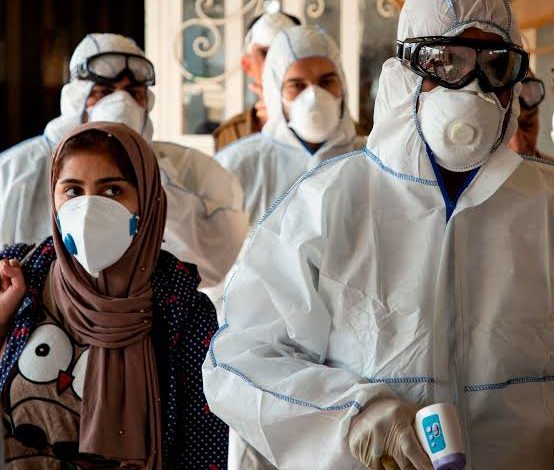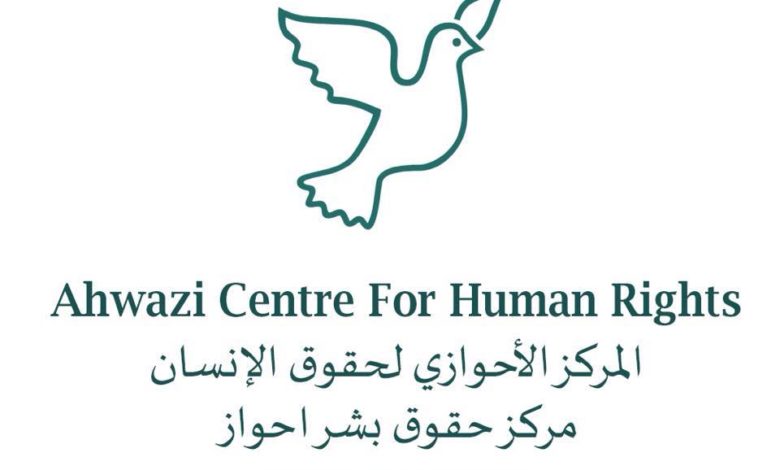Ahwazi workers protest over dismissals, demand 5 months of withheld pay
On June 13, dozens of Ahwazi workers gathered in front of the 8th District municipality headquarters in Ahwaz to protest 5 months’ worth of salary withholdings. Ahwazi Arab workers congregated at the main gate of the building demanding municipal officials expedite payment in full of wages owed to them.The workers stated that they have faced very difficult economic conditions due to prolonged salary deprivation as well as an unprecedented rise in prices of goods across Ahwaz. They stressed the importance of being able to secure their families’ livelihoods in this month of Ramadan by holding up signs saying: “One who does not demand his rights has no dignity. Eid is approaching – do not let us feel ashamed in front of our families!” Protesters also drew attention to the massive inequalities between workers and their employers with signs saying: “The monthly income of manager is 12 times the income of an Ahwazi worker.”
A report from the Statistics Center of the Iranian regime in July 2016 indicated that 66% of the Ahwazi who are able to work are unemployed. This is particularly revealing in light of the extent Ahwazi Arabs are subjected to racial discrimination when pursuing employment opportunities. Systematic discrimination of ethnic minorities continues to remain a prevalent practice under the Iranian regime. Despite the Ahwaz region, which neighbours Iraq, housing over 90 percent of the oil and gas reserves which are the source of Iran’s wealth, over 90 percent of the indigenous Ahwazi people live in desperate poverty under blatantly racist and savagely oppressive policies. Denied the most basic of human rights, including the right to speak their native Arabic language, since Iran’s 1925 occupation and annexation of the country, Ahwazis suffer the highest levels of arbitrary arrest, imprisonment, and execution, with torture being standard. Only Iran’s Sistan-Baluchistan region suffers from comparable levels of destitution.
The Iranian regime is currently engaged in a large-scale project to change the region’s demographic composition, building ethnically exclusive ‘Persian-only’ settlements. The regime offers an array of financial and other incentives to encourage ‘pure’ Persians to move to Al-Ahwaz, all of which are denied to the Ahwazi people, including well-paid jobs, homes with all amenities, generous subsidies and preferential status in all areas. Meanwhile, many Ahwazis, especially in rural areas, live on less than one dollar per day in unimaginable poverty and conditions best described as medieval, without access to clean water, electricity or the most basic of amenities.
Unemployment and desperate poverty are endemic amongst Ahwazis, with the regime reserving all but the most menial and insecure labour for incoming Persians. While Ahwazis are prohibited from owning businesses, Persians are offered inducements, including business loans and good homes, to encourage them to move to the region.Even for those Ahwazis in work, there are no rights, with many working 11 or 12-hours per day six days per week for less than five dollars per day.
Ahwazi workers are prohibited from strike action or forming unions to advocate for their rights. Those who do take strike action or protest over low pay or unpaid wages are routinely summarily dismissed or reported by their employers to police and security forces (all Persian). Arrest and imprisonment are standard for any Ahwazis protesting against these grotesquely unjust conditions, with the verdict of the regime’s courts in any case against an Ahwazi being a foregone conclusion. None of the company owners or management staff, again all Persian, will face any penalties for their abuse of employees, effectively giving them carte blanche to treat the Ahwazi people as slave labour.
For the majority of Ahwazis in rural areas, with no work or welfare services and facing an ever-worsening environmental crisis that denies them even clean water, the situation is even more desperate; even their historic occupations like farming are increasingly denied to them, although incoming Persians are offered generous agricultural subsidies by the regime to relocate to the region. The Iranian leadership’s naked anti-Arab racism, which is not a new development but a longstanding supremacist doctrine underpinning the rule of both the Shah and the clerical regime, extends to all areas in al-Ahwaz, including education and healthcare.
In healthcare, for example, while Persians enjoy the benefits of a social security system, medical insurance and access to healthcare in both public and private hospitals, the few public hospitals available for Ahwazis (who are, of course, denied access to private healthcare) are severely dilapidated and run down, lacking basic medical equipment and failing to meet the most basic criteria set for Persians’ hospitals and clinics. Even in emergencies, Ahwazis are banned from treatment in Persian hospitals.
Interviewed by Tehran’s Fars News Agency, the head of the Ahwazi Medical Services organization Ismail Aydini said recently that all of the Ahwaz region’s hospitals are in desperate need of repair, upgrades, and renovations, requiring basic medical equipment and devices and in need of at least 3,500 more beds. In some Ahwazi cities and towns, the regime authorities have built only the basic structures of the hospitals, which lack even roofs to protect them from the elements, leaving them in this state for over 20 years. In one such hospital, in the town of Khafajyeh, the unfinished building has become a barn where animals take shelter.Some other towns, including Khor Mousa, Howeyzeh, and Al-Besitin(Bostan), lack even a basic clinic or health centre, with Khor Mousa’s 150,000-plus residents needing to travel to the port city of Mahshor a few kilometres away to see a doctor.Falahiyeh city also is one of the most deprived Ahwazi cities, its indigenous Arab people are marginalised and are suffering from an extreme poverty and lack of basic needs.
The education system for Ahwazis is similarly dire and neglected, in marked contrast to that available to Persians, with Ahwazis even forbidden from being educated in their own language, Arabic. Ahwazi educators and activists found to be teaching in Arabic are subject to imprisonment, torture and often execution on fabricated charges such as being ‘enemies of God.’ The regime has begun waging an ecological war against Ahwazis in a shameful attempt to put an end to the whole life of Ahwazis. Not only were hundreds of thousands of Ahwazi people affected; thousands of various species of fish, birds, reptiles, mammals and seasonal migratory birds are now exposed to racial drying by Tehran regime whom continues to allow the remaining parts of the wetlands to be abused by the oil companies under the control of Revolutionary Guards. These companies began speeding up the process of drilling and exploring oil in the middle of the wetlands; which is destroying all the rest of the marsh water and swamps of Ahwaz.
It is a very tough task to capture all of the appalling crimes this regime has committed against Ahwazis. With the passage of each day, the regime makes life more unbearable for the Ahwazis, through the imposition of poverty, the invasion of narcotic drugs in the Ahwaz community, through damage to the community’s environment, and through chauvinistic demographic policies intentionally applied in Ahwazi Arab-populated areas. Moreover, the aggressively totalitarian culture has often resorted to indiscriminate and wanton violence to silence protest. The regime has even accelerated recent chauvinistic trends by demolishing irreplaceable archaeological sites cherished by the Ahwazi people. Thus, all that remains of Ahwazi heritage is threatened with complete destruction.
Despite the efforts of successive regimes for almost a century to annihilate Arab identity in al-Ahwaz – of which the current clerical regime has been the most brutal – the people have refused to be subjugated, to surrender their identity or to accept Iranian supremacy. This heroic quiet resistance and determination to maintain Arab identity on the part of the region’s people has met with ever-more savage racist oppression by the leadership in Tehran. In spite of these many decades of grotesque injustice, the Ahwazi people will persist in their battle for human rights, for justice and for freedom from Iran’s grotesque apartheid system.
C: Rahim Hamid
S: aLiBz




